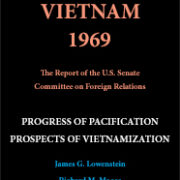Vietnam 1969 Progress of Pacification, Prospects for Vietnamization by James G. Lowenstein & Richard M. Moose
The epub format below is for your Apple and Android devices including Send-to-Kindle.
As you may know, Amazon has changed to the epub format to use with the Send-to-Kindle program. A great feature of the Send-to-Kindle program is that the file will go directly to your Library folder, and not have to be searched for in ES File Explorer or another app. If you use the mobi format in Send-to-Kindle, you will now get an error message. You can see instructions about Send to Kindle at https://www.amazon.com/gp/sendtokindle/email.
If you or your students want to download directly from this web site to an Amazon device, you can use the mobi format below. When you find the mobi file in ES File Explorer, it will then open in the Kindle app on your tablet. If you download an epub file to your Amazon tablet, it will also open if you have an app such as Overdrive on your tablet. The Kindle app offers an excellent reading experience to start with. Overdrive may need some customization of font size.
Editorial Reviews
In their report to the Senate Foreign Relatons Committee in 1969, Lowenstein and Moose wrote about their interviews with the senior political and military leadership in Vietnam and also with villagers in the countryside. They complain in the report of often receiving contradictory answers to the same questions depending on whom they are asking. And they complain that briefings are rarely objective.
“In sum, whether inadvertently or deliberately, briefings do not objectively present the pros and cons but rather emphasize progress and accomplishment. Being briefed in Vietnam is somewhat like being told to buy product X without being told what is wrong with it or why to buy product Y.”
The New York Times called thieir report “a bombshell.”
“They interviewed all the major figures — Ambassador Ellsworth Bunker, Gen. Creighton Abrams, Vietnamese politicians — but also midlevel officers. They read volumes of field reports and traveled the length of South Vietnam, meeting with village elders.
“Their report, released in a redacted version to the public in early 1970, was a bombshell. The administration’s plans, they wrote, ‘seem to rest on far more ambiguous, confusing and contradictory evidence than pronouncements from Washington and Saigon indicate.’”
“The war, they concluded, ‘appears to be not only far from won but far from over.’”




Leave a Reply
Want to join the discussion?Feel free to contribute!